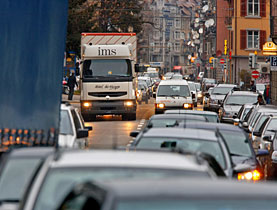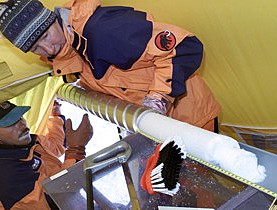People power prepares to fight global warming

A people's initiative calling for the government to slash greenhouse gases by 30 per cent by 2020 is set to come to a nationwide vote.
Pressure is mounting on the authorities to do more to fight global warming in Switzerland, especially after the government’s latest package of measures met with a mixed response.
Green groups and centre-left parties handed in their initiative to the Federal Chancellery in the capital, Bern, on Friday.
They managed to collect more than 150,000 signatures in just a year. To force a vote, 100,000 signatures have to be collected in 18 months under Switzerland’s system of direct democracy.
For Thomas Vellacott, president of the initiative, the popularity of the proposal – people were reported to have queued up to sign it – showed how important the environment was to the Swiss.
“We know that people are getting fed up with a situation where everyone’s talking about doing something about climate change but no one’s actually doing anything,” he told swissinfo. “People are ready to see some action.”
The initiative calls for carbon dioxide emissions to be cut 30 per cent below 1990 levels.
“We’re saying that we want it to be achieved in Switzerland, so we don’t want it to be achieved by buying cheap credits abroad when we know that four out of ten are actually insufficient or nothing happens,” explained Vellacott.
The committee, which includes the non-governmental organisations WWF Switzerland and Greenpeace, as well as the Social Democratic and Green parties, also want to push for action concerning energy efficiency and renewable energy.
Realistic goal
Vellacott, who is also WWF Switzerland’s conservation director, said that the 30 per cent target was realistic – the government has just set a 20 per cent target by 2020 – because other countries are already going further. Germany has already announced that it would cut its emissions by 40 per cent.
A 60 per cent reduction would be technically feasible, according to Vellacott, but “would only be possible at great cost”.
The government’s proposal, announced on February 21, would bring it in line with the European Union. It would be followed by a more ambitious goal of 50 per cent by the middle of the century – an annual reduction of 1.5 per cent.
Among the most controversial of the measures that it set out was the plan to delay the introduction of a levy on carbon dioxide emissions from petrol.
Vellacott said there were some good initiatives but that an overall clear goal for tackling climate change was missing.

More
Direct democracy
Warnings
He said scientists have warned that if the world was to avoid dangerous global warming – categorised as above two degrees over pre-industrial temperatures – countries would have to reduce their emissions by up to 40 per cent.
“I’m afraid the proposition that came out of the government doesn’t do that. They’re basically saying it’s ok if global temperatures rise by three or four degrees,” he added.
It will still be some time before the 30 per cent reduction initiative comes to a vote. First the government has to state its position, and then the proposal will go to parliament.
Vellacott estimates it could take about two years, but given the level of support now, he says he is quite confident about the vote.
Until then, he added, the group will continue to lobby for environmental issues to be kept on Switzerland’s domestic and international agenda.
swissinfo, Isobel Leybold-Johnson
Scientists say carbon dioxide (CO2) contributes to the greenhouse effect and global warming. In Switzerland, it represents around 80% of harmful man-made emissions.
The other gases include methane, nitrous oxide and hydrocarbons.
Despite ambitious emission targets, greenhouse gas emissions have actually risen by 0.4% in Switzerland since 1990.
In the midst of a heated debate over how best to combat global warming, much of the world has actually spent the early part of 2008 encased in a cold snap.
Tens of thousands of cashmere goats, the source of comfy fibres for expensive sweaters, have been freezing to death in China.
Moving west, Baghdad sands have been blanketed with snow for the first time ever and North America is experiencing record flurries and shiver-inducing cold snaps. Ice levels on both poles are also on the upswing, it has been reported.

In compliance with the JTI standards
More: SWI swissinfo.ch certified by the Journalism Trust Initiative












You can find an overview of ongoing debates with our journalists here . Please join us!
If you want to start a conversation about a topic raised in this article or want to report factual errors, email us at english@swissinfo.ch.